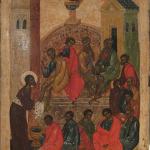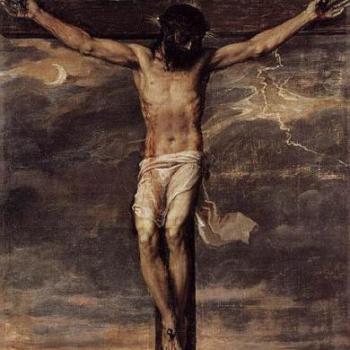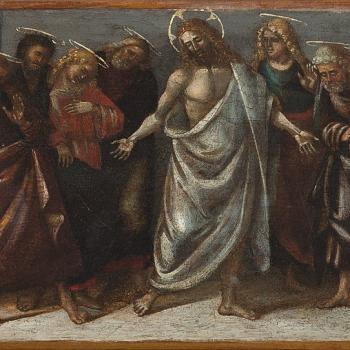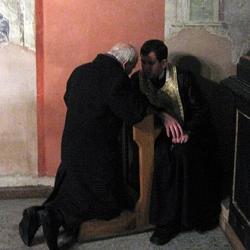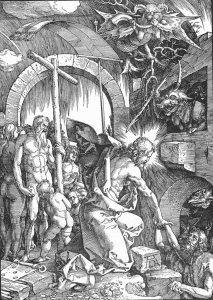
In this post, I reflect upon the ancient creedal declaration that Jesus “descended into hell.” I connect it to the early Catholic teaching of “limbo” and apply it to my adult son’s ongoing ordeal with TBI. I also consider its import for other people’s extreme suffering.
Today is Holy Saturday, which falls between Good Friday that recounts Jesus’ death on a cross and Easter Sunday that celebrates Jesus’ resurrection from the dead. Many people ask: where did Jesus go after his crucifixion and death on Friday afternoon until early Sunday morning?
The Apostles’ Creed asserts that “He suffered under Pontius Pilate, was crucified, died, and was buried; he descended to hell. The third day he rose again from the dead.”
Some look to the following canonical text as proof that Jesus descended to hell: “For Christ also suffered once for sins, the righteous for the unrighteous, to bring you to God. He was put to death in the body but made alive in the Spirit. After being made alive, he went and made proclamation to the imprisoned spirits—to those who were disobedient long ago when God waited patiently in the days of Noah while the ark was being built.” (1 Peter 3:18-20; NIV)
There is much debate on what these statements mean. There is a sense in which the meaning is up for grabs, or in a state of theological or literary limbo. We are not going to try and resolve the debate in this post. (For two articles on the Apostles’ Creed’s statement about Jesus’ descent into hell, please refer here and here.)
Some Christians believe that Jesus descended to hell to experience greater suffering. Critics will reply that this idea appears to conflict with Jesus’ declaration on the cross that “It is finished.” Still others maintain that Jesus liberates imprisoned souls from the realm of the dead. In my estimation, the notion that Jesus descended into hell signifies his total identification with humanity and victory over sin, death, hell, and the devil. He is Lord of all domains and states of existence.
I was reflecting on this subject last night after conversing with my wife about our son’s situation. We have witnessed small signs of extremely slow, often exceptionally subtle improvement since Christopher’s catastrophic brain injury over two years ago. We rejoice in whatever small signs of progress we observe. But much of the time, we wait in silence.
Yesterday, my wife accompanied Christopher and his wheelchair in the van transport to his baclofen pump appointment where the pain doctor increased the dosage of baclofen to help reduce spasticity. Christopher’s mom reported that Christopher was not really responsive yesterday, though he did cough up his secretions a great deal. (This in itself is good news, since it helps to guard against possible pneumonia.) I said in response that we exist in this state of limbo that seems like an eternity. We sojourn with Christopher somewhere between the living and the dead in what can seem like the outer realm of hell.
I reflected further on this subject earlier this morning. In ancient and medieval Roman Catholic theology, “limbo” stood for “the border place between heaven and hell where dwell those souls who, though not condemned to punishment, are deprived of the joy of eternal existence with God in heaven.” Existentially, I often feel that way in this unfathomable journey with TBI.
Encyclopedia Brittanica notes that “Two distinct kinds of limbo have been supposed to exist.” It summarizes the two kinds of limbo in the following way:
(1) the limbus patrum (Latin: “fathers’ limbo”), which is the place where the Old Testament saints were thought to be confined until they were liberated by Christ in his “descent into hell,” and (2) the limbus infantum, or limbus puerorum (“children’s limbo”), which is the abode of those who have died without actual sin but whose original sin has not been washed away by baptism. Traditionally, this “children’s limbo” included not only dead unbaptized infants but also the mentally impaired.
I cannot do justice to this much-debated theological topic in one blog post. But to be honest, I am more interested in the import of this debate for those who suffer here and now this side of the grave in a state of existential limbo.
You may be experiencing chronic physical, emotional, mental, and spiritual pain. You may not see any end in sight. Like me, you may feel as if you are in a state of limbo, not in the realm of the dead per say, but rather dangling by a thread in a fragile state of existence somewhere between the living and the dead.
I experience comfort in knowing that this state of existential limbo will not last forever. Moreover, the one who died and rose again did not avoid suffering, death, and an intermediate state of isolated existence. Rather, he identifies with us fully. Jesus’ life was exceptionally hard, as one can discern from even a cursory reading of the canonical gospels. This painful and poignant truth comforts me. Yes, he conquered sin, death, and the devil. And yes, I believe he has mercy on little children, as we find in the gospel stories. No doubt, he also has mercy on those who are “mentally impaired,” like my son.
Lord Jesus, deliver Christopher, who bears your name, and my family, from this state of limbo in which we find ourselves. Deliver each of those who cry out to you from the painful limbo they also endure. Meet us this day and this hour in this extreme state of vulnerable existence somewhere between the living and the dead. Lord Jesus, thank you for descending into our darkness. May your life-giving, comforting presence bring light to our darkness and make a heaven out of hell.
For the various posts and updates I have written on this journey with Christopher and TBI, please refer here. Thank you for your care and prayers!



